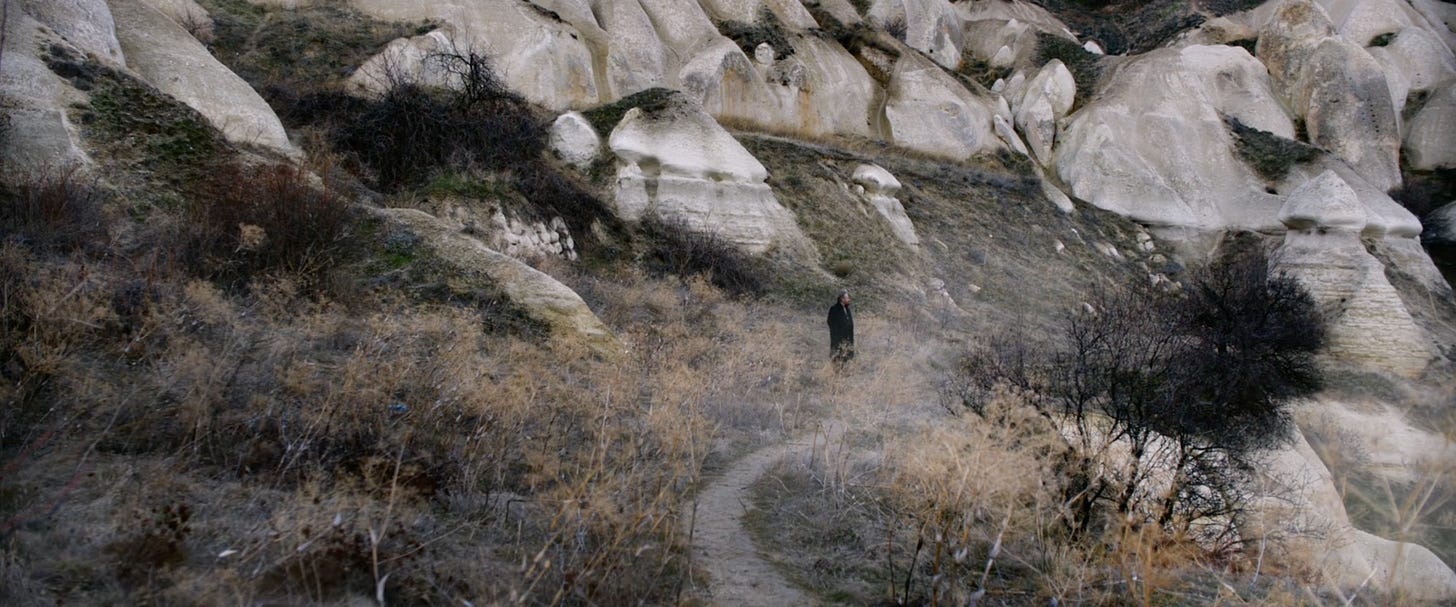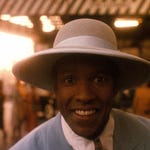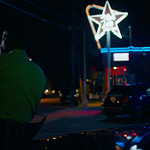Dear friends,
Perhaps what really marks out Nuri Bilge Ceylan’s seventh feature film, Winter Sleep (Kış Uykusu), against his prior work is the different method by which it encodes time. It’s not necessarily inaccurate to taxonomise this in terms of “cinematic” drama versus the distinctly “theatrical”—but of course, things are never that simple. At the very least, Ceylan’s talky, Chekhov-inspired tragicomedy uses its stagey sense of conversation in a manner that remains specially and intrinsically filmic.
The nuts and bolts of the film’s form are simple: the drama consists of lengthy dialogues, each held within one of relatively few settings. Ceylan cuts more frequently than in his earlier, so-called “slow” films—Uzak (2002) being the exemplar—but the cutting he deploys here, during those lengthy conversations, deliberately implies continuous time rather than elision and other filmic trickery. From the off, Winter Sleep—a film about the travails and the considerable ego of a former stage actor, turned landlord and hotelier—seems to be consciously aping the temporality of a stageplay.
Ceylan's use of style, though, creates real tensions between the stage and the screen, and so actively interrogates those differences in medium. Whatever its storytelling approach, this is obviously conceived as a film, and much of its atmosphere comes from the director’s characteristic use of uniquely beautiful establishing shots; his awareness and understanding of landscape and its poetic opportunities. The exacting rhythms of these conversations are key, too: Ceylan and his co-writer (and wife), Ebru Ceylan, would often bring rewrites to successive rehearsals and even shoots, working with the actors to craft material that ultimately lies at some precise stylistic intersection between the philosophic, the mundane, the comic, the serious, the contemporary, the timeless. One can certainly use similar techniques in honing a play, but with film the simple act of selecting the best take of a scene—or threading together different takes—creates something totally different: a meta controlling presence that immediately redefines the moment in which that take was filmed.
So it is that, like many good films adapted from plays, the typical feeling of stage-time throughout these long dialogue scenes is instead displaced; made something else. In that sense, though Winter Sleep is not—as we remark on the podcast—strictly ”slow cinema”, its primary concern is still adjacent to that mode, in that it explores how the cinematic object exists within the flow of time. And this film, unlike many good films adapted from plays, reflexively reminds us that there is such a thing as “real time”—but in a different medium, one where the performers are unmediated by the screen. Ceylan then practises a judicious editing style that simultaneously clings to the “real” time of the stage (and the “stagey” film) and takes full advantage of film’s fluidity as a means of encoding this time. It is significant that the source for the Ceylans’ screenplay is not, in fact, a play; the writers instead use their lead character Aydin, a retired thespian (played ingeniously by Haluk Bilginer), as a means to create and explore staginess, in a manner seemingly incidental to the key themes of the stories from which they draw. The temporal tension, then, is less an end in itself and more a brush with which to paint the film’s more specific socio-political musings. Winter Sleep’s unending eristic, its constant combative chatter that seems to emanate from the very consciousness of its belligerent, entitled, pathetic protagonist, is undergirded by the film’s palpably constructed, almost fussy dramatic cadences.
As a final thought: this multi-pronged link between duration, pace, structure and meaning (as well as between “the theatrical” and “the cinematic”) is subtly reinforced by Ceylan’s use of action. Punctuating the lengthy conversation scenes are illustrative physical moments—a rock thrown at a car; the capturing of a horse—that stand out for their directness. The majority of Winter Sleep’s runtime is dialogue, defined in the Ceylans’ writing by its disputation, evasion and obfuscation; these less wordy punctuations, however, allow the plotting to aim for the apparent; the indisputable. In so doing, the writers allow us to re-situate the characters and their endless chatter, and so puncture their justifications, self-definitions and, ultimately, agency. In other words: whatever they may say about themselves, and even whatever the filmmakers seem to be saying, it is we, with our lengthy opportunity to observe the characters, who get the final say. (Ceylan has spoken often of his desire to avoid providing his own outright interpretation.)
This is explored in a rather playful manner during the movie’s fiery dramatic climax, for which Ceylan and co-editor Bora Göksingöl break from their prior editorial approach and create extended parallel action, cross-cutting between scenes that respectively focus on Aydin and his wife, Nihal (Melisa Sözen). It’s a whole new sense of time that creates a whole new sense of drama, and it finds the film’s makers thinking through the characters in a whole new way. It demonstrates ultimately that despite the confessed literary and theatrical influences of Winter Sleep, Ceylan’s practice here relies on a type of rigid control, not just of theme and character, but time itself, that only comes with the cinema.
The final grace note? That, for all this, our protagonist learns absolutely zilch. Now, that’s how you steer a long drama.
Thanks as ever for listening!
—Calum & Eddie
















Share this post